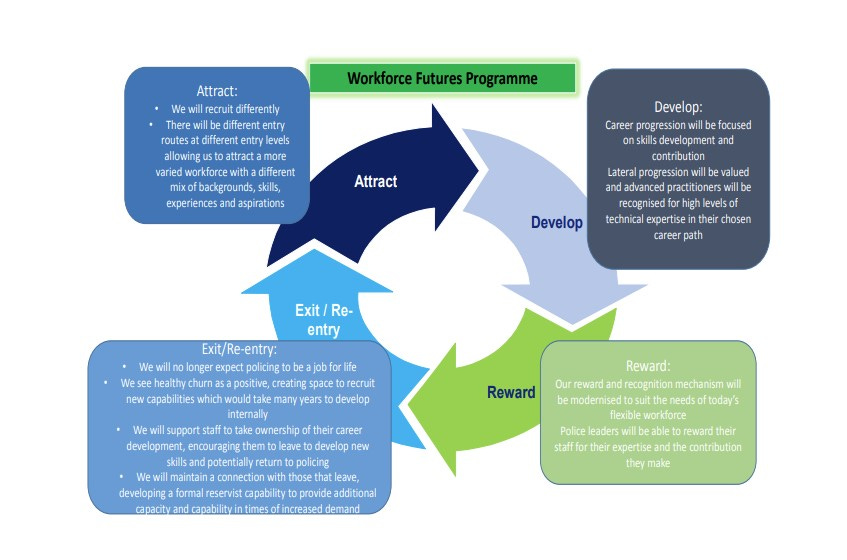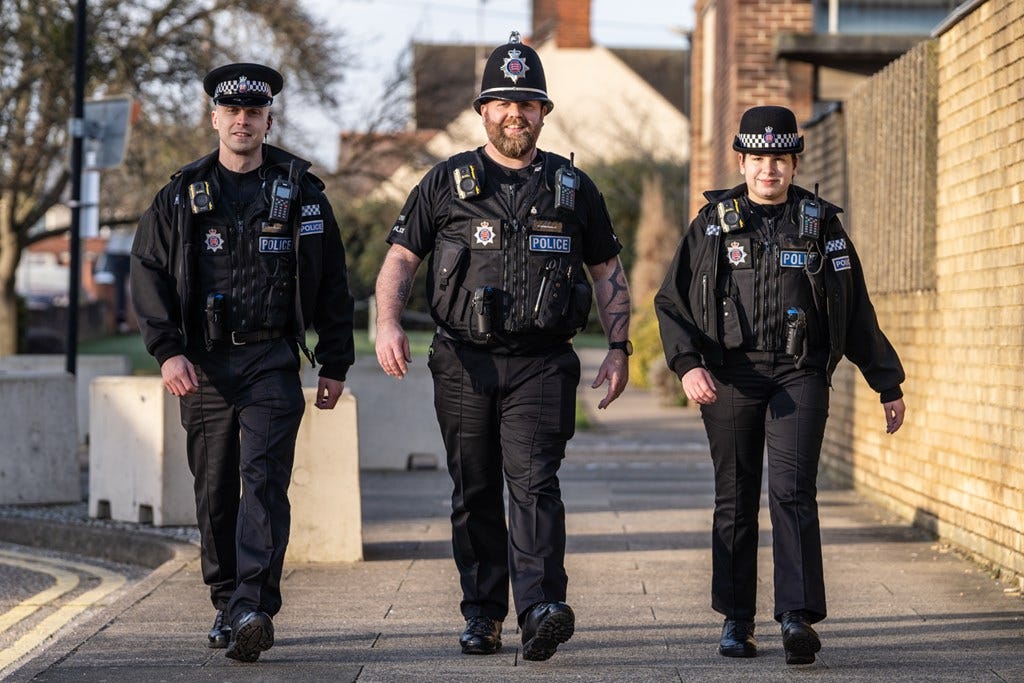I have one because it’s true. You can get yours from ‘Bullshire Police’
I’m happy to report my ex-Met colleagues remain highly employable in their dotage. One has a successful career working for NGOs in Africa and the Middle East. Another’s a security manager in the defence industry. I know a bloke doing something for NATO. Others are compliance officers, training instructors and work in cybersecurity. There’s an ex-Job electrician and another who plans on doing some beekeeping. Only one of us is a hack writer with a snarky Substack.
Interestingly, we all left as constables - the lowest police rank. And despite our very different skillsets, career aspirations and personalities, we all have one thing in common: There are no circumstances, whatsoever, in which any of us would ever return to policing.
How we laughed at the letters begging us to come back! I gave mine a Viking funeral on my barbeque, not least because the Met failed to identify they’d medically retired me a year previously. That’s what happens when you outsource HR, I suppose.
My old colleagues’ post-Met success probably explains the thriving ex-police recruitment industry. So a recent news article caught my eye, because police resignations have increased dramatically. As The Independent reports, “almost 9,200 officers left the police service in the year to March, up over 1,000 on the previous 12 months, and the proportion departing through voluntary resignation is rocketing.”
This, apparently, is part of a cunning plan hatched by the National Police Chief’s Council back in 2016 as part of their pay board submission for lower ranks. It’s a plan where people putting in their papers - via a secret type of management sorcery beyond the ken of mere mortals - is a good thing. It’s called ‘Churn.’ It means people moving in and out of an organisation keeps things fresh. New blood and all that. All of the horrible, gnarly, prejudiced older cops are replaced by bright-eyed young things, full of emotional intelligence and empathy. And they can leave too, to be slightly less bright-eyed young things somewhere else, before they become too much of a pension liability. After, of course, they’ve given the best years of their lives to The Job.
Here’s how it works. You, there, at the back! Stop giggling.
The wheel of fantasy created by the National Police Chief’s Council in 2016, designed to roll the Winsor turd in glitter. Promotions and medals all round!
Here’s the killer line, carved from a huge block of ossified, weapons-grade, management-speak bullshit: We will no longer expect policing to be a job for life… we see churn as a positive, creating space to recruit new capabilities which would take many years to develop internally.
On police pay, right? I can see hordes of highly qualified cybersecurity ninjas leaving 70K-plus jobs to join the police, just to be ordered around by a spotty direct-entry superintendent who doesn’t know how to use Deliveroo. So they say churn. I say bleed. It wouldn’t be so laughable if they’d implemented it effectively.
Of course, policing is increasingly complex, albeit sometimes unnecessarily so. Yet, despite protestations to the contrary (and the seven-year old Workforce Futures Programme), policing remain frustratingly one-size-fits-all. As it is, the main thrust of novel entry into the service is all about (you guessed it) managers.
Putting the boot into this stuff is too easy.
I also want to offer solutions from a career constable’s point of view. Part of the problem is those trying to map police career models have never really done the Job (and that includes Police Federation types who’ve been away from the real world too long). They’re like aliens studying earthlings. Why are they happy to work in one place for so long? Why are such simple things important to them? Why do they not want to be promoted like us? Why don’t they respond positively to this icy cold probe?
A college of Policing working group unsuccessfully tries to identify why a DC no longer wants to work on local CID
if I woke up tomorrow and discovered I’d been promoted to UK Policing Supremo (I’d do it for free), this is what a police career might look like. Happy police officers are usually productive police officers.
My model even has an element of ‘churn.’ Except I’m calling it flexibility. It allows officers to enter and exit policing without losing access to pensions. Most UK institutions live in silos. You’re either in or you’re out. That needs to change.
Yay! These Adlerville BCU officers are happy because they’ve just learned I have been appointed UK Policing Supremo for life
Here’s a tale of two police officers working on Adlerville Basic Command Unit (BCU) in 2028.
Emma’s a six-year service DC on local CID. She’s currently on the acquisitive crime team, investigating burglaries and robberies. As a local CID officer, she earns a twelve percent ‘core duty’ bonus on top of her salary, contingent on satisfactory performance and attendance. The bonus scales pro rata if she takes part-time hours, which she did a year ago when her first child was born.
She enjoys her job, although ultimately she wants to be a financial investigator - she worked in compliance at a building society before joining the police. Emma’s already agreed with her DI to work one day a week with the borough financial crime team while she prepares for her FI exams - since the force devolved more specialist functions to local BCUs, career development has become fairer (especially for carers and other part-time workers, who no longer have to travel to force HQs). The officer in charge of Adlerville’s financial crime unit is a direct-entrant DS, who worked in the banking sector before seeking a midlife career-change. Rumour has it he got a golden handshake to join, but there isn’t much he doesn’t know about fraud. A few of the specialists at HQ were unhappy at the changes, but they got used to it. There’s still a central unit for the most serious cases.
Emma’s noticed more detectives stay on local CID for longer nowadays, which means she gets fewer cases to manage and less officer burnout. The force doesn’t just talk about mental health, either; there’s a team at HQ who roll-out nurses and support staff to serious incidents involving death or serious trauma to debrief officers. It also helps that Emma’s DCI is bullish about protecting staff from the more pernicious aspects of HOCR, something fully supported from the top (courtesy of the UK’s new Police Supremo, who links civil service pay to savagely cutting bureaucracy). Officer welfare is specifically baked into the police promotion framework nowadays, so even uber-ambitious sociopaths are forced to take their staff into account on their way to the top.
All in all, the Adlerville CID office is a good place to work. There’s even the occasional office lunch. In fact, the only people grumbling are the officers who used to work at HQ on EDI projects, many of who left rather than deal with criminals. Some even moaned about not receiving the core duties bonus Emma receives for honest-to-god coppering.
Emma also knows, if she wants to, she can leave policing and ‘freeze’ her original pension. In the old days, you might leave the Job and find yourself on a new scheme when you rejoined. Like her friend Jasmine, she could also opt for reserve police service (RPS), which replaced the old Special Constabulary. RPS officers are paid for the shifts they perform, pay is pensionable and they provide ‘flex’ capability for the force as and when necessary. Jasmine says RPS (she does one ten-hour shift a week while looking after her son and studying for a non-police related qualification) is easier to manage than part-time working, as RPS is a force-level resource. It’s also rewarding and keeps her in touch with old colleagues and policing in general. She might even return full-time; RPS officers are eligible to apply for regular duty in specialist roles.
Meanwhile, PC Jared is reaching the ten-year service point. A uniform response officer, his dilemma is whether to go for promotion or not. During his time at Adlerville BCU (his second police station) he’s worked response, crime squad, public order and six months on the area surveillance support wing. That was useful, actually, as now he’s discovered sneaky beaky stuff isn’t for him.
Furthermore, since the BCU signed a watertight memorandum of understanding with social services, Jared’s work is pretty much centred on fighting crime. It’s so much better than when he joined in 2018, when most of the shift revolved around responding to mental health calls. There’s also a car park, shower block and newly-built canteen. The newer officers take this for granted, thinking he’s swinging the lamp when he tells them about the days when cops would be shouted at for eating a burger in public.
Jared’s also search-qualified - prior to joining the police he was an accredited trainer in the Royal Engineers. This qualification was check-tested at HQ and fully honoured by the force (who saved themselves the cost of an expensive course). Jared spends two or three days a month working on POLSA ops, which makes a change from his usual duties. He’s also paid a search allowance for the days he works, which encourages him to keep his ticket in date. On top of his ten percent core response allowance, it all adds up. Mind you, his mate at an unpopular inner-city BCU just had his allowance upped to fifteen percent. It’s something to think about.
Jared’s problem is too many options, and that’s before he even thinks about an HQ role. He’s recently volunteered to be a tutor for new student constables (who are being renamed ‘Probationers’ and given deprogramming courses to explain why making tea for the rest of the shift isn’t exploitative). Again, his BCU arranged for his army training qualifications to be refreshed - they want to keep him at Adlerville for as long as possible. It used to be different, because the police would stubbornly refuse to recognise outside qualifications, usually as part of a closed-shop mentality by specialist departments. He’s now spending three months looking after new recruits joining the BCU.
As for promotion? Jared might put it off for another year and see how the training gig works out. He can always apply for the ‘Senior Constable’ scheme, which involves patrol supervision and mentoring. He’ll still be out on the streets, though. His sergeant seems to spend a lot of her time sitting at her computer. For all his strengths, Jared’s not much of an admin guy.
As for the future? As someone who joined the police as a second career, Jared has an army pension to add to his police equivalent. Promotion or not, he reckons he’s in the Job until retirement.
I’m sure you get my drift - in my experience police officers thrive on meaningful, varied and rewarding work.
TL;DR?*
We urgently require equitable pay reform that recognises role, skills and responsibilities. It might even prompt the NPCC’s magical churn - internally and without resignations.
The time has come for devolution for central specialist teams. Stop treating local police stations as volume crime and social work factories. Bring back officers and resources to deal with criminality bordering NIM levels 1 and 2 (in fact, let’s take a fresh look at NIM while we’re at it). Specialists should advise, not hog all of the best work. There’s still too much ‘squad chauvinism’ in policing. There are also too many local criminals absolutely taking the piss because of this capability gap - they know Old Bill are fixated on stats, not proactive policing.
A bridging rank between PC and Sergeant has been mooted forever - it’s now badly needed; the majority of the police workforce has less than five years service. I was previously sceptical about this one, but guess what? I listened to others, people with experience, and changed my mind. NPCC please note.
We need a hybrid-working model, facilitated by a proper police reserve. Ex-Specials, if they make the grade, are welcome to apply. The good ones deserve every penny. The indifferent shouldn’t have warrant cards in the first place.
Previous professional and trade qualifications should be honoured. The case of Jared is based on the (opposite) experience of a colleague who joined the Met from the Royal Engineers. He taught POLSA to police officers, but was initially refused the opportunity to do search work ‘because he was a probationer.’ I’ve also seen police driving tickets from force ‘A’ not being recognised by force ‘B’. This mindset badly needs to change. Training exists for the benefit of the force, not training empires run by relatively low-ranking officers.
And, lastly, one for the chief constables; check your HQ for dusty corners where project-dwellers lurk. There will be too many, often riding hobbyhorses for ambitious chief superintendents. Re-deploy them fairly, with proper training and with due regard for their experience. I know this, because at one point (reluctantly) I was almost one of them.
It sounds simple, doesn’t it?
It isn’t.
The devil loiters in every detail, emboldened by a small army of vested interests. Which is why we need a revolution. A clearing of the decks. An entire cohort of mediocrities clinging onto chief officer rank need to go, people who began their ascent up the greasy pole during the Tony Blair years. The time when the police-as-social-work ethos took root, whether Blair meant for it to happen or not.
Conversely, many rank-and-file officers need to move out of their comfort zones too. Now is the time to be radically ambitious for policing’s operational ranks, by accepting not every force - or police officer - is the same.
Before policing’s ‘churn’ turns into its death spiral.
*TL;DR stands for ‘too long; didn’t read’
Take care and thanks for reading and subscribing. I’ll be back in a couple of weeks.
Dom








250 chief ranks in police according to home office. Wtf do they all do one asks? Seek a roundabout of getting under wing of someone two ranks up, do multitude of projects and fuckwittery, jump when that mentor jumps, each rises taking their disciples along with them. Why does Cambs have its own force but ox doesn't? Why does Yorkshire have 3 forces? Why does Cleveland have its own force? Its all utterly irretrievably and completely broken.
An excellent article. I returned to Borough just before retiring, and was in the BIU tasking assets to service output from our local source unit... Wanky jobspeak for find people to do a simple search warrant or set up an OP, or surveillance, based on A1 'For Action' Intel. All the hard work of identifying who was at it, when they were busy, and where they kept their gear had already been done, it was low hanging fruit for the Met. However, other than some of the simplest search warrants, I struggled with finding people or people with skills on Borough to take on these kind of jobs. We had a small 'uniform' tasking unit who would (on paper) be the go-to, but they were often used to make up numbers on response or Aid so could only take on a fraction of the jobs, and even then only the 'quick time' ones. Most jobs sat between Borough and Squads terms of reference, interest and capability. There was nothing like the old Area Crime Squads to hand off decent targets to. Intel would sit on the system until it withered into 'historic'. Targets and drugs/stolen property were untroubled by Police action. I eventually skipped the chain of command and spoke to the Borough Chief Super about it. Oh I felt so stupid when she pointed out the simplicity of it, I just needed to 'work smarter' and 'do more with less'.
We should have crime squads on Borough and cross Borough, able to take on output from local source units. However, that kind of work and the 'temptations' involved would need some grown up support/supervision. Op Sumaq springs to mind. Not sure the risk/reward works for the current crop of managers.
'Designed to roll the Winsor turd in glitter'... Oh bravo sir, bravo. Accuracy, brevity, speed.